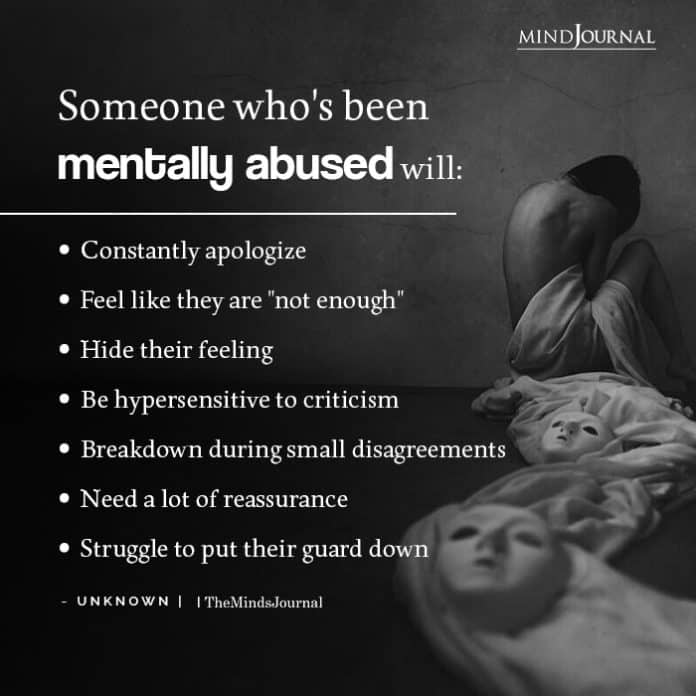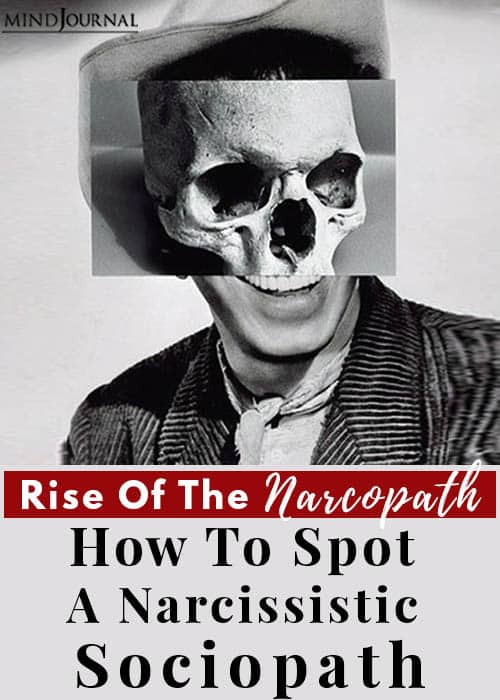What can be worse than a narcissist or a sociopath? A narcopath. It is a dangerous mix of narcissism and sociopathy that leads to aggressive and sadistic behavior.
Who is a narcopath?
In short, narcopaths are simply Narcissistic Sociopaths. Narcopath is a new unofficial term that is used to describe someone with two certain types of personality disorders
Narcopaths tend to meet the diagnostic criteria for these two types of Cluster B personality disorders that are categorized by the American Psychiatric Association’s Diagnostic and Statistical Manual of Mental Disorders, 5th Edition (DSM-5). This psychological syndrome is also identified as malignant narcissism which involves characteristics of narcissistic personality disorder (NPD), sociopathy, sadistic personality disorder, and paranoia.
“A person with malignant narcissism has the potential to destroy families, communities, nations, and work environments,” explains neuropsychologist Rhonda Freeman, Ph.D.
Narcissistic Sociopaths care only about themselves, lack empathy, have an unrealistic sense of grandiosity and entitlement. They are often hostile and can easily dehumanize the people around them. They are highly abusive, manipulative, pathological liars who are psychologically aware.
Related: Who Is a Malignant Narcissist? Who Are The People They Target
The condition may also include symptoms such as –
- Emotional detachment
- Need for control
- Lack of authenticity
- Poor self-identity
- Constantly seeking positive attention and praise
- Lack of concern about how their behavior affects others
- Desperate need for approval
Moreover, people with both ASPD and NPD are highly likely to exploit others for their personal gain or pleasure. However, not every narcissistic sociopath will have all the same traits. They may not behave or act in the way we expect a narcissist or a sociopath to behave. Rhonda adds “There is heterogeneity, of course, because people are complex.”
Why we use the term ‘narcopath’
Although Cluster-B personalities are generally addressed as psychopaths or sociopaths, which may be extreme and even inaccurate, the term Narcopath is now being used to describe narcissistic sociopaths or malignant narcissists to avoid confusion. Moreover, there is some controversy regarding sociopathy and psychopathy being similar yet different disorders in the same spectrum.
Hence, most people now tend to use Narcopath to describe someone with traits of both NPD and ASPD. However, this is not a medical term nor is used by professionals. Additionally, someone can be identified with NPD or ASPD only after they have been clinically diagnosed.
What the typical narcopath looks like
As every person is different and unique, it can often be difficult to identify a narcissistic sociopath. They can be the most well-dressed, charming, and wittiest people in the room. They are often smart and successful and know exactly what to say to hook their victims. They are good at reading others and will never hesitate to use your weaknesses against you. However, the entire process is usually very subtle which is why you may only realize the reality once it is too late.
They may seem perfect to others, have a respectable reputation, and appear generous in public. But, it is mostly a display that helps them appear better than others. They are master manipulators who abuse and exploit others for their own pleasure or personal gain. They can be emotionally, physically, and sexually abusive to you on a personal level, while others may not even have a single clue about their true personality. They are callous, cold, and uncaring individuals who believe they deserve attention from everyone else.
“They will have a disdain for people and think it’s okay to exploit and dispose of others in whatever way it helps them to get ahead,” explains author Arlin Cuncic, MA. They never hesitate to manipulate others to gain their love and trust and then dominate and control them. A narcopath is always striving to gain power and control over others without feeling an ounce of guilt. When they feel a person is not serving their purpose any longer, they will discard them without hesitation. As they are hard to spot, they can be especially dangerous in relationships.
Related: 3 Ways Narcissists and Sociopaths Manipulate To Gain Control Over You

Identifying narcopaths
Narcopaths are hard to spot unless their personality disorder starts to affect their daily life and the lives of the people around them. Narcissism can often worsen with the traits of sociopathy. According to research, narcissistic sociopaths or malignant narcissists possess characteristics of:
1. Narcissistic personality disorder (NPD)
2. Antisocial personality disorder (APD)
3. Aggression
4. Sadism
5. Paranoia
As narcopaths possess traits of both NPD and ASPD, we need to first understand the diagnostic criteria for these personality disorders as laid down by the DSM-5:
1. Narcissistic Personality Disorder (NPD)
In order to clinically diagnosed with NPD, a person must have at least five of the following symptoms:
- Sense of entitlement
- Strong need for excessive admiration
- Lack of empathy
- Grandiose or sense of self-importance
- Preoccupation with fantasies of unlimited power, success, physical attractiveness, brilliance or ideal love
- Believes that they are unique and special and should only socialize with or be understood by other high-status or special individuals or institutions
- Interpersonally exploitative behavior for personal gain
- Arrogant and haughty attitudes and behaviors
- Envious of others or a thinks that others are jealous of them
Related: Is Your Partner A Sociopath Or A Narcissist?
2. Antisocial Personality Disorder (ASPD)
According to the DSM-5, ASPD should only be diagnosed when the person is at least 18 years of age. They should also experience conduct disorder by age 15 and the symptoms should not be caused due to bipolar disorder or schizophrenia.
ASPD is “a pervasive pattern of disregard for and violation of the rights of others,” indicated by the presence of at least three of the following symptoms:
- Persistent failure to conform to social norms leading to grounds for arrest.
- Deceitful behavior involving conning others, lying and using aliases
- Failure to plan ahead or impulsivity
- Aggressiveness and irritability leading to assaults and physical fights
- Little or no concern or disregard for the safety of others or self
- Constant irresponsibility resulting in failure to complete education or hold jobs
- Lack of remorse or indifferent about hurting & mistreating others
20 Signs of a Narcopath

If you are having a hard time identifying narcopaths in your life, then there are certain signs and symptoms that you need to look out for. While not every narcopath may display the same characteristic traits, here are some of the most common signs of malignant narcissists that you need to identify:
1. Inability to handle negative feedback due to hypersensitivity to criticism.
2. Tend to become aggressive or have angry outbursts when challenged.
3. Willfully and proactively manipulate & exploit others for personal gain or pleasure.
4. Excessively concerned about their physical appearance.
5. Believe they are superior and deserve to be treated accordingly.
6. Inflated sense of self and lack of self-regulation.
7. Lack of empathy.
8. Delusions of grandeur.
9. No remorse or regrets about hurting others.
10. Strong sense of entitlement.
11. Hidden insecurity, poor self-esteem & weak sense of self.
12. Egocentric and tend to dominate conversations.
13. Mistreat or insult others they believe are inferior.
14. Shift blame on others for their own faults and mistakes.
15. Highly charismatic, sophisticated, and witty.
16. Tend to be highly envious of others.
17. Strong need for attention, praise, and external validation.
18. Sadistic and antisocial attitudes, and behaviors.
19. Self-identify as bullies, abusers, and pathological liars.
20. Suicidal or homicidal thoughts and behaviors.
Related: 9 Ways to Identify A Sociopath, Psychopath, or Narcissist in your life
So how can you know if you have a narcopath in your life?
Here are a few questions you need to ask yourself:
- Do you feel compelled to take responsibility for their mistakes and toxic behaviors?
- Do they make you feel you are always at fault instead of them?
- Do they shower you with love and attention and then suddenly stop the love bombing?
- Do they use silence, insults or criticism to punish you?
- Do they constantly seek compliments about their appearance?
Author and marriage & family therapist, Dr. Athena Staik explains “Narcissistic sociopaths prey on women with certain vulnerabilities. They go after them with a strategy to get into and control their mind, thus their behaviors.” They often engage in strategic predatory behavior to prove their dominance. “Their motto is to win, and that means to get them before they get you,” adds Athena.
Narcopaths in relationships
People with both Narcissistic Personality Disorder and Antisocial Personality Disorder (ASPD) tend to have little or no regard for the rights and feelings of others. They consider people as objects that they can use, abuse, exploit and discard without any remorse. So if you are in a relationship with a narcopath, then it is highly likely you are in an abusive and unhealthy relationship.
During the initial phases of a relationship, a narcopath will drown you with compliments. As things start to move at warp speed, you will fail to realize how you went from the first date to living together in merely a matter of days. Author Allison Zapata explains “A narcopath will sweep you off your feet, place you on a pedestal, then worship you from down below.” But when everything feels too good to be true, it usually is.
Just when they realize they have gained your trust and have you in their control, that is exactly when the abuse begins. It often begins small with indirect criticisms and insults disguised as jokes. Soon, every discussion starts to revolve around them and everything you do starts to seem wrong and inappropriate. As the constant criticism starts to eat away your self-esteem and self-confidence, you become increasingly co-dependent on them.
You begin to forgive their abusive and toxic behavior mistaking it as their love for you. And this makes it hard for you to leave them. The more ASPD traits a narcissistic person has, the more they will emotionally and mentally exploit you.
“Individuals with this profile can form connections with others. However, they process information in ways that can hurt society in general, but also the people who love or depend on them,” writes Rhonda Freeman Ph.D. Malignant narcissism or ‘narcopathy’ can prove to be highly problematic for the victims.
They can often make you feel stressed, anxious, intimidated, and afraid of the narcopath due to their suspiciousness, hypersensitivity, impulsivity, aggression, and lack of empathy. They can resort to hostility when you challenge their opinions or show confidence as it makes them look ‘bad’ in front of others or even you.
Rhonda adds “Those who interact with malignant narcissists often consider them jealous, petty, thin-skinned, punitive, hateful, cunning, and angry.”
Narcopaths are also highly likely to cheat repeatedly with multiple partners and find a way to maintain the relationship as well. They are also poor parents who can abandon children without hesitation. Walking away from the relationship and going no contact is perhaps the best way to deal with a narcopath when you’re in an abusive relationship with them.

Can a narcopath be dangerous?
A narcopath can be harmless or they may be highly dangerous to others and themselves. They can be extremely abusive and are known to have suicidal and homicidal tendencies. These individuals can be difficult to tolerate whether you know them personally or professionally. It can be especially difficult for you if you are in an intimate or romantic relationship with them.
People with Cluster-B personality disorders can successfully manipulate their partners to stay with them even after years of abuse. Narcopaths can also be physically and sexually abusive to their children and may even murder their children, in rare cases. These individuals are also highly prone to criminal behavior and imprisonment.
According to a 2017 study, around 83% of men and 87% of women have a personality disorder when committing a crime. Antisocial personality disorder (ASPD) is one of the most common mental disorders associated with criminal behavior. One study reveals that substance & alcohol abuse and dependence along with “antisocial personality disorder are particularly associated with an increased risk of violent/homicidal behaviors.”
However, as narcopaths lack any concern regarding the consequences of their action or for the safety of others and themselves, they are highly prone to suicidal behavior as well. Studies reveal that rates of unnatural death due to suicide, accidents, and homicide are extremely high among people with ASPD. A recent scientific analysis explains that antisocial personalities have “increased mortality rates due to accidents, traumatic injuries, suicides, and homicides.”
Related: PTSD is a Thing After Life with a Sociopath
The female narcopath
It’s not only men who can be dangerous narcissistic sociopaths. Narcopathic women can also be dangerous to others especially as they are not expected to be affected by such personality disorders. In fact, female narcopaths are actually protected in society due to existing stereotypes of being gentle, protective, and sweet.
People usually don’t suspect a woman to be ruthless, cruel, or vindictive. They don’t expect a mother to neglect, or abandon her children; they don’t expect a wife to abuse her husband or drive him to suicide. Bestselling author Shahida Arabi writes “Female narcissists, especially if they also possess antisocial traits, can cause just as much psychological harm as male malignant narcissists.”
Research indicates that female homicidal behavior is often associated with mental and personality disorders. But these women are less physically abusive than their male counterparts. As they are often hard to identify, such women are usually known as Covert Narcopath.
How to cope with a narcopath
Are you stuck with a narcopath and don’t know how to deal with them? As they are highly manipulative, it is likely that you believe they are not as toxic as they behave and they are actually a good person inside. You may even be prone to believe that you can ‘fix’ them eventually. This is why the best thing you can do is accept the reality, gain awareness, and walk away from the narcissistic sociopath.
Author Arlin Cuncic writes “The first step to dealing with this person is to stop reinterpreting the facts. Don’t give someone with a narcissistic sociopathic personality the benefit of the doubt.”
If they are not abusive, then you need to be more assertive, establish healthy boundaries to protect yourself, and realize that they will never change. However, if you are in an abusive relationship, especially one that involves physical violence, then you need to leave immediately and seek support from trusted friends and family. You can never win an argument against them.
Here are some other effective ways to cope with a narcopath:
1. Know that they are hard to deal with
It will always be challenging to cope with narcissistic sociopaths. They have poor boundaries and no regard for anyone’s rights or feelings. Clinical psychologist and Harvard lecturer Craig Malkin, Ph.D. says “There is no ‘coping with’ malignant narcissists, except to stand up for ourselves, speak to those who can help, assert ourselves, and enlist allies for protection.”

2. Completely avoid them
When you can identify the signs of a narcopath, you need to avoid spending too much time with them. If your boss or coworker has this personality disorder, then minimize contact as much as possible and avoid engaging in arguments with them. But most of all, avoid being in relationships with them.
Related: Are You Being Emotionally Abused By A Sociopath? Here’s What You Need To Know
3. Don’t challenge them
You will never win against a narcopath. They are not reasonable or logical individuals. When challenged, they may become highly aggressive, hostile and retaliate in whatever way they can to win. They will not refrain from insulting you to control and dominate the situation. The best way to deal with them is to communicate in a non-confrontational way, set your boundaries, make your point and leave. Do not allow them to suck you into their toxic world.
“If you do need to confront the person, try not to do so in front of a large audience or they will want to save face and will feel more threatened, sparking more retaliation,” suggests author and wellness coach Elizabeth Scott, MS.
4. Forget about changing them
Understand that you will never be able to change them or make them a better person. If you expect them to change their personality or behavior then you will simply set yourself up for disappointment.
5. Walk away
If you are in an abusive relationship with a narcopath, then you need to leave immediately. “Since some narcissists can be abusive, it’s important to ask yourself if you’re safe and leave if you can,” adds Craig Malkin. Talk to a loved one or a mental health professional to figure out how you can safely leave a toxic, abusive relationship with a person having both NPD & ASPD.
6. Seek support
Seek help and support from trusted and loving family members and friends to overcome the abuse and toxicity that you will experience while being with a malignant narcissist. If the effects of the abuse are too severe, then it’s best to consult a therapist or a counselor for professional guidance and help.

Narcopaths are charming yet toxic
Certified psychiatrist/psychoanalyst Carrie Barron, M.D. explains a narcopath as “intelligent, high functioning, soft-spoken, charming, tearful/seemingly emotional, gracious, well mannered, kind and have the ability to form relationships.” This can not only make them appealing but make it hard to identify their real personality. They are paranoid, sadistic, and ruthless people who lack morals, empathy, and conscience.
Related: 17 Signs We’re Used or Abused in a (So-Called) Relationship
If you know someone who meets the medical diagnostic criteria for a person with both Narcissistic personality disorder and Antisocial personality disorder, then it is important that you avoid them as they can be dangerous. Although not all narcissistic sociopaths are homicidal or suicidal, they are highly manipulative and exploitative individuals. So make sure to set strong personal boundaries, distance yourself from them, and look for a safe way to leave.
Here is an interesting video that you may find helpful:
Frequently Asked Questions:
What is the difference between a covert narcissist and an overt narcissist?
A covert narcissist is one who lacks empathy but craves admiration and wants to be felt important. On the other hand, an overt narcissist is like a traditional narcissist and people can easily see their narcissistic traits. A covert narcissist can behave in a slightly different manner than an overt narcissist.
What is the difference between a sociopath and a narcissist?
Sociopaths are least bothered about the pain and welfare of others. They are very calculating and gain pleasure from their acts. On the other hand, a narcissist behaves and acts in a way that leads to self-inflation. They may harm others in the pursuit of some kind of larger goal and in the quest to appear as a grand personality.
What are the characteristics of a Narcissistic Sociopath?
A narcissistic sociopath has both antisocial personality traits and narcissistic personality disorder traits. Antisocial personality traits include – aggression, impulsivity, and disregarding laws, rules, and social norms. Narcissistic Personality Disorder traits include – self-importance, grandiosity, arrogance, the attitude of entitlement, seeking validation. No wonder why a Narcissistic Sociopath is one of the most unpredictable and dangerous personality types.











Leave a Reply